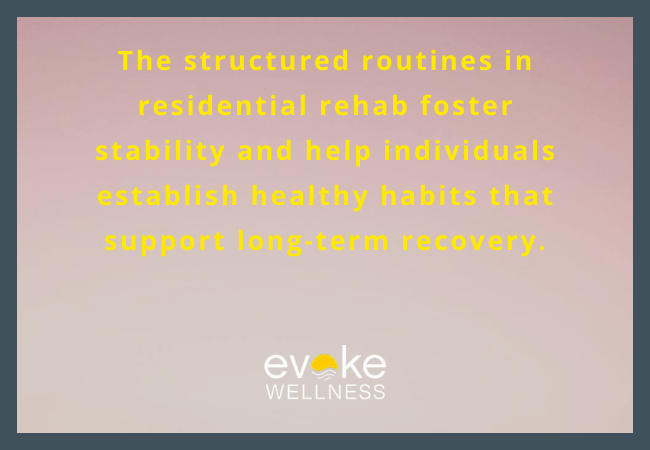For individuals struggling with addiction or co-occurring mental health conditions, selecting the right residential rehab facility is one of the most critical decisions they will make. This choice can shape the course of recovery, influence the likelihood of long-term sobriety, and even impact overall mental and emotional well-being. But with so many programs and centers available, how do you know which one is the right fit?
Choosing a rehab facility isn’t just about location or amenities—it’s about finding a place that aligns with your specific needs, values, and goals. The right environment should not only address substance use but should also prioritize emotional healing, behavioral changes, and sustainable recovery strategies. Below, we’ll explore the core elements to look for in a residential treatment program to help make an informed and confident decision.
Understanding the Role of Residential Rehab in Recovery
Residential treatment provides a structured, immersive environment where individuals can step away from everyday stressors, triggers, and temptations. Unlike outpatient care, residential rehab offers 24/7 support and supervision, which can be especially important in the early stages of recovery.
What sets a high-quality residential program apart is its ability to create space for deep, meaningful change. Here, clients can develop new coping skills, process trauma, and receive comprehensive care in a safe and compassionate setting. Choosing a program with a strong clinical foundation and a holistic approach is vital to ensuring that treatment addresses more than just the symptoms of addiction—it reaches the root causes.
Individualized Treatment Plans Matter
Every person entering recovery has their own unique history, challenges, and goals. The best residential programs recognize this and develop treatment plans tailored to the individual rather than using a one-size-fits-all model.
An effective facility will begin with a comprehensive assessment that examines not just substance use history, but also mental health status, family dynamics, physical health, and past traumas. From there, clinicians craft a personalized roadmap that includes therapy, medication management (when needed), education, and support services designed specifically for the individual’s path.
Facilities that offer this kind of attention to detail are often more effective in delivering lasting results. It ensures that treatment meets people where they are, builds on their strengths, and addresses their unique vulnerabilities.
The Importance of Integrated Dual Diagnosis Care
Many people who struggle with addiction also experience co-occurring mental health disorders. Depression, anxiety, PTSD, bipolar disorder, and other conditions are frequently intertwined with substance use. If these underlying issues are not treated alongside the addiction, the risk of relapse increases significantly.
This is why selecting a Dual Diagnosis Treatment Program in Ohio is a key factor to consider. Programs that provide integrated care—where both addiction and mental health are treated concurrently—help people develop insight into how these challenges are connected and how to manage them effectively. With a team of licensed professionals who understand the complexities of dual diagnosis, clients receive more complete and compassionate care.
Evaluating Clinical Therapies and Program Offerings
The therapeutic methods used at a residential facility are another critical factor. Evidence-based therapies such as cognitive-behavioral therapy (CBT), dialectical behavior therapy (DBT), trauma-informed care, and group therapy should form the foundation of the program. These modalities have been shown to help individuals change harmful behaviors, reframe thinking patterns, and build skills for healthy emotional regulation.
Additionally, holistic and alternative therapies such as art therapy, yoga, mindfulness training, and fitness can complement clinical work and offer new outlets for healing. When evaluating a Residential Treatment Center in Ohio, look for programs that provide a balance between traditional and holistic care.
Family Involvement and Support Systems
Addiction doesn’t happen in isolation—it often affects the entire family. That’s why involving loved ones in the treatment process can be such a powerful part of recovery. Family therapy, educational sessions, and family weekends help repair damaged relationships, improve communication, and build a foundation for healthy support outside of treatment.
Access to a Family Therapy Program in Ohio can make a substantial difference. These services teach families about addiction, reduce blame and guilt, and empower them with tools to support their loved one’s recovery journey. A facility that prioritizes family involvement is one that understands the importance of healing the system, not just the individual.
Specialized Programs for Substance-Specific Needs
Different substances require different types of support, especially during detox and early recovery. Whether someone is struggling with alcohol, opioids, benzodiazepines, or stimulants, the facility should have experience and protocols in place to manage these safely and effectively.
For example, individuals in need of an Alcohol Addiction Treatment Program in Ohio should ensure the facility has medical professionals on staff who are trained in managing alcohol withdrawal and providing support during early sobriety. Proper detox services, medication-assisted treatment when appropriate, and therapeutic approaches tailored to the specific substance all play a role in safe and successful recovery.

The Role of Inpatient Support and Monitoring
Residential care is intensive for a reason. The level of support provided in these programs ensures safety, accountability, and continual therapeutic engagement. A top-tier Intensive Inpatient Treatment Program in Ohio will offer round-the-clock supervision, access to licensed mental health professionals, and a full daily schedule of therapeutic activities.
This structure is essential for building healthy routines, minimizing opportunities for relapse, and helping clients adjust to a lifestyle of recovery. The longer individuals are engaged in consistent care, the better their outcomes tend to be.
Peer Support and Group Healing
Connection is at the heart of recovery. One of the most transformative elements of residential rehab is the opportunity to connect with peers who are going through similar challenges. These relationships help reduce feelings of isolation and create a sense of belonging, which can be deeply healing.
Programs that emphasize group therapy as a central component offer clients the chance to learn from one another, build trust, and develop social skills that are essential for long-term recovery. Whether it’s processing shared experiences or offering encouragement during difficult times, group therapy fosters emotional growth in a way that individual therapy alone cannot.
Finding a program with a strong Group Therapy Program in Ohio can ensure that clients benefit from both peer support and professional guidance throughout their stay.
Why Choose Us?
At Evoke Wellness at Hilliard, we believe that every individual deserves comprehensive, compassionate care that addresses all aspects of addiction and mental health. Our team is committed to delivering excellence through personalized treatment plans, evidence-based therapies, and a deeply supportive environment where healing can take root.
As a trusted Addiction Treatment Center in Ohio, we specialize in providing residential care that integrates both clinical and holistic approaches. Whether you’re navigating substance use, trauma, co-occurring disorders, or simply looking for a safe space to begin again, we are here to walk beside you with respect, expertise, and empathy.
From your first call to aftercare planning, our multidisciplinary team supports each client with dignity and dedication. Here, recovery is not just about getting sober—it’s about building a life of meaning, health, and purpose.
Conclusion
Choosing the right residential rehab facility is about more than just checking boxes—it’s about finding a place that feels safe, supportive, and equipped to meet your unique needs. A program that offers individualized care, treats co-occurring disorders, includes family involvement, and supports a structured healing environment can make all the difference.
Long-term recovery requires more than abstinence. It takes a deep commitment to healing the mind, body, and spirit. With the right foundation and the right support, anyone can begin again. If you or someone you love is ready to take that first step toward a better future, don’t wait. Contact our team today at 866.430.9267 to learn more about how we can help you find the right path to recovery.
Frequently Asked Questions (FAQs)
What should I look for in a residential rehab facility?
When choosing a residential rehab facility, consider the following: the facility’s approach to treatment (individualized care, dual diagnosis treatment), the therapies offered, the facility’s reputation, and aftercare programs. The best facilities will offer evidence-based treatments like cognitive-behavioral therapy, group therapy, and family therapy. Additionally, ensuring a supportive and compassionate environment is key to long-term recovery.
How do I know if residential rehab is the right choice for me?
Residential rehab is often the best option for individuals who need a structured, immersive treatment environment to overcome addiction or mental health challenges. If you have struggled with outpatient treatments or are dealing with co-occurring disorders, residential treatment can offer 24/7 support and a distraction-free setting to focus on recovery.
What types of therapy are used in residential rehab?
Residential rehab facilities offer a variety of therapies, including cognitive-behavioral therapy (CBT), dialectical behavior therapy (DBT), trauma therapy, family therapy, and group therapy. These therapies address the psychological, emotional, and behavioral aspects of addiction and help individuals develop the tools needed for long-term recovery.
Can my family be involved in my treatment?
Yes, family therapy is often a key component of residential rehab. It helps rebuild relationships, educates loved ones about addiction, and fosters healthier communication patterns. Including family members in the recovery process can strengthen support systems and improve outcomes for the individual in treatment.
How long does residential rehab treatment last?
The length of residential treatment varies based on individual needs and progress. Most programs last anywhere from 30 to 90 days, with the option for extended care depending on the severity of the addiction and any co-occurring mental health conditions. The facility’s clinical team will work with each person to determine the appropriate length of stay.



